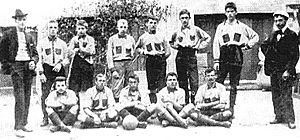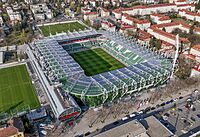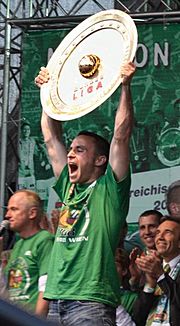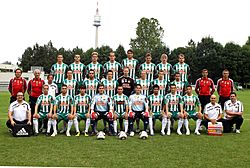SK Rapid Wien facts for kids
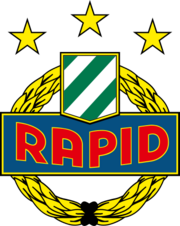 |
|||
| Full name | Sportklub Rapid | ||
|---|---|---|---|
| Nickname(s) | Die Grün-Weißen (The Green-Whites), Hütteldorfer, Rapidler |
||
| Founded | 8 January 1899 | ||
| Ground | Allianz Stadion | ||
| Capacity | 28,345 | ||
| Chairman | Alexander Wrabetz | ||
| Head coach | Peter Stöger | ||
| League | Austrian Bundesliga | ||
| 2024–25 | Austrian Bundesliga, 5th of 12 | ||
|
|
|||
Sportklub Rapid, usually called Rapid Wien or Rapid Vienna, is a professional football club from Vienna, the capital city of Austria. Rapid Wien has won the most Austrian championship titles, with 32 wins. They won their first title in the 1911–12 season. They also won a German championship in 1941 during a difficult time in history.
Rapid Wien has never been moved down to a lower league, just like their big rival, FK Austria Vienna. Rapid reached the final of the UEFA Cup Winners' Cup twice, in 1985 and 1996, but they lost both times.
The club is often called Die Grün-Weißen (The Green-Whites) because of their team colors. They are also known as Hütteldorfer, which refers to Hütteldorf, the area where their stadium is located.
Contents
Club History
Rapid Wien started in 1897 as the Erster Wiener Arbeiter-Fußball-Club (First Viennese Workers' Football Club). Their first team colors were red and blue, which they still sometimes use for away games. On January 8, 1899, the club changed its name to Sportklub Rapid. This name was inspired by a German club called Rapide Berlin. People often add "Wien" or "Vienna" when talking about the club, but it's not part of their official name. In 1904, the team changed its colors to green and white.
Rapid Wien won Austria's very first national championship in the 1911–12 season. They won by just one point and then won the title again the next season.
Rapid's Dominance Between World Wars
Rapid Wien became a very strong team between the two World Wars. During this time, Austria was one of the best football nations in Europe. Rapid won three titles in a row from 1919 to 1921.
After Austria became part of Germany in 1938, Rapid joined the German football system. They played in a top league called Gauliga Ostmark. Rapid was the most successful Austrian club during this period. They won the Tschammerpokal (which is like today's DFB-Pokal) in 1938. They beat FSV Frankfurt 3–1 in the final. Then, in 1941, they won the German Championship. They played against FC Schalke 04, which was the strongest German club back then. Rapid came back from being down 3–0 to win the match 4–3!
Rapid in European Competitions
As the champions of the 1954–55 season, Rapid Wien was Austria's team for the very first European Cup in the next season. They played against PSV in the first round and won their home game 6–1. Even though they lost the away game 1–0, they still moved on to the quarter-finals. There, they tied 1–1 at home against Milan but lost the away match 7–2. This meant they lost 8–3 overall.
Rapid's best performance in the European Cup was in the 1960–61 season. They reached the semi-finals but were knocked out by Benfica, who went on to win the tournament.
In 1984, Rapid was part of a big controversy in the UEFA Cup Winners' Cup. They were playing against Celtic. Celtic was winning 4–3 overall when Rapid got a penalty. As Rapid players argued, their defender Rudolf Weinhofer fell down and said he was hit by a bottle from the crowd. However, TV replays showed the bottle didn't hit him. Rapid asked UEFA for the game to be replayed. UEFA made them replay the game far away from Celtic's stadium. The game was played in Manchester, England, and Rapid won 1–0.
Rapid reached their first European final in 1985. They lost 3–1 to Everton in the Cup Winners' Cup Final. Eleven years later, in 1996, they reached the same final again but lost 1–0 to Paris Saint-Germain.
Rapid last played in the group stage of the UEFA Champions League in the 2005–06 season. They won their qualifying matches to get there. However, they finished last in their group, losing all their games against strong teams like Bayern Munich and Juventus.
In 2015, Rapid's youth team took part in the Football for Friendship program, which brings young football players from around the world together.
Women's Football Section
In 2022, members of the club asked for a women's football section to be started, and it was approved. Katja Gürtler became the first head coach in August 2023. The first women's team started playing in the 3rd division of the Austrian Women's football league system in the 2024–25 season.
In their first season, they won their league without losing any games. They also won the regional Cup competition. They then won a special play-off game, which means they will play in the 2. Bundesliga for the 2025–26 season.
Club Culture
The Rapid Quarter-Hour
For a very long time, Rapid fans have had a special tradition called the "Rapid-Viertelstunde" (Rapid Quarter-Hour). This is when fans clap rhythmically during the last 15 minutes of a match, no matter the score or where the game is played. This tradition started as early as 1913. Over the years, there have been many times when the team was losing but managed to win in the final minutes, thanks to their fans' support.
Rapid Wien Fans
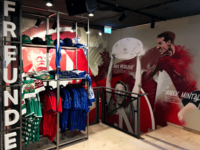
The biggest fan club for Rapid Wien is called Ultras Rapid, started in 1988. Other important fan groups include Tornados Rapid and Spirits Rapid.
Rapid's most active supporters gather in the Block West stand at their stadium. This area can hold 8,500 fans. The old Block West at their previous stadium had about 2,700 seats.
Rapid Wien fans have friendly connections with supporters of other clubs. These include 1. FC Nürnberg from Germany, GNK Dinamo Zagreb from Croatia, Venezia F.C. from Italy, Ferencvárosi TC from Hungary, and Panathinaikos F.C. from Greece. Since Rapid, Ferencváros, and Panathinaikos all wear green, their alliance is sometimes called the "Green Brothers."
Rapid's Stadium
Rapid Wien used to play at the Gerhard Hanappi Stadium. This stadium opened on May 10, 1977, with a game against their rival, Austria Wien. The stadium was named after Gerhard Hanappi, a famous player who also designed the stadium. Before 1980, it was known as the Weststadion (Western Stadium) because of its location.
In June 2014, it was announced that a new stadium, the Allianz Stadion, would be built where the old one stood. While the new stadium was being built, Rapid played their home games at the Ernst Happel Stadion.
The Allianz Stadion officially opened on July 16, 2016. Rapid Wien played a friendly match against Chelsea and won 2–0.
Rivalries: The Vienna Derby
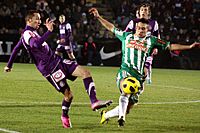
Rapid Wien has a big rivalry with their local city opponent, FK Austria Wien. This match is known as the Vienna derby. Both clubs are very popular and successful in Austria. They are also the only Austrian clubs that have never been moved down to a lower league.
Both teams originally came from the same part of Vienna, but they have since moved to different districts. Austria Wien is often seen as a club for middle-class fans, while Rapid traditionally has strong support from working-class people in the capital.
The two clubs first played each other in a league game on September 8, 1911. Rapid won that match 4–1. This rivalry is one of the most played derbies in European football, similar to the Old Firm derby in Glasgow between Rangers and Celtic.
Club Achievements
Rapid Wien holds the record for the most championship titles in Austria, with 32 wins. They also won a German Championship and a German Cup when they were part of Germany's football competition from 1938 to 1945.
| Type | Competition | Titles | Seasons |
|---|---|---|---|
| International | Mitropa Cup | 2 | 1930,
1951 |
| Domestic | Austrian Bundesliga | 32 |
1911–12, 1912–13, 1915–16, 1916–17, 1918–19, 1919–20, 1920–21, 1922–23, 1928–29, 1929–30 |
| German Championship | 1 | 1941 | |
| Austrian Cup | 14 |
1918–19, 1919–20, 1926–27, 1945–46, 1961–62, 1967–68, 1968–69, 1971–72, 1975–76, 1982–83, 1983–84, 1984–85, 1986–87, 1994–95 |
|
| German Cup | 1 | 1938 | |
| Austrian Supercup | 4 | 1986,
1987, 1988, 2008 |
- record
Continental Finals
- Runners-up: 1984–85, 1995–96
Players and Staff
Current Squad
|
|
Players on Loan
|
SK Rapid II (Reserve Team)
|
|
Famous Former Players
| Nation | Name | Years | A | Position | G | SR |
|---|---|---|---|---|---|---|
| Richard Kuthan | 1911–1926, 1927-1929 | 244 | Striker | 164 | 0.672 | |
| Josef Uridil | 1918–1925, 1926-1927 | 106 | Striker | 127 | 1.198 | |
| Edi Bauer | 1911–1926 | 188 | Striker | 133 | 0.707 | |
| Ferdinand Wesely | 1920–1931 | 206 | Striker | 121 | 0.587 | |
| Robert Dienst | 1948–1962 | 284 | Striker | 307 | 1.080 | |
| Franz Weselik | 1923–1934 | 175 | Striker | 160 | 0.914 | |
| Rudolf Flögel | 1958–1972 | 332 | Striker | 145 | 0.436 | |
| Matthias Kaburek | 1928–1936, 1939-1945 | 158 | Striker | 138 | 0.873 | |
| Johann Riegler | 1948–1961 | 272 | Striker | 160 | 0.588 | |
| Peter Schöttel | 1986–2002 | 436 | Defender | 4 | 0.009 | |
| Michael Konsel | 1985–1997 | 395 | Goalkeeper | |||
| Hans Krankl | 1970–1978, 1981–1986 | 350 | Striker | 267 | 0.763 | |
| Gerhard Hanappi | 1950–1965 | 333 | Midfielder | 114 | 0.342 | |
| Reinhard Kienast | 1978–1992 | 393 | Midfielder | 61 | 0.155 | |
| Heribert Weber | 1978–1989 | 315 | Defender | 39 | 0.124 | |
| Helge Payer | 2001–2012 | 298 | Goalkeeper | |||
| Franz Binder | 1938–1948 | 242 | Striker | 267 | 1.103 | |
| Ernst Happel | 1942–1954, 1956–1959 | 240 | Defender | 25 | 0.104 | |
| Walter Zeman | 1945–1961 | 235 | Goalkeeper | |||
| Robert Körner | 1942–1958 | 212 | Striker | 80 | 0.377 | |
| Alfred Körner | 1942–1959 | 286 | Striker | 157 | 0.548 | |
| Andi Herzog | 1986–1992, 2002–2003 | 174 | Attacking midfielder | 37 | 0.213 | |
| Andreas Ivanschitz | 2000–2005 | 147 | Attacking midfielder | 25 | 0.170 | |
| Leopold Grausam | 1963–1970 | 142 | Forward | 58 | 0.408 | |
| Roman Wallner | 1999–2004 | 134 | Forward | 42 | 0.313 | |
| Florian Kainz | 2014–2016 | 98 | Midfielder | 15 | 0.153 | |
| György Garics | 2001–2006 | 99 | Full-back | 3 | 0.030 | |
| Erwin Hoffer | 2006–2009 | 85 | Forward | 41 | 0.482 | |
| Guido Burgstaller | 2011–2014, 2022–2025 | 158 | Forward | 58 | 0.367 | |
| Hamdi Salihi | 2009–2012 | 67 | Forward | 36 | 0.537 | |
| Boli Bolingoli-Mbombo | 2017–2019 | 56 | Left-back | 3 | 0.054 | |
| Alyaksandr Myatlitski | 1991–1993 | 58 | Defender | 9 | 0.155 | |
| Joelinton | 2016–2018 | 60 | Midfielder | 15 | 0.250 | |
| Trifon Ivanov | 1995–1997 | 53 | Defender | 7 | 0.132 | |
| Ante Jazić | 2001–2004 | 107 | Left-back | 1 | 0.009 | |
| Zlatko Kranjčar | 1983–1990 | 210 | Striker | 106 | 0.505 | |
| Mario Bazina | 2006–2008 | 72 | Midfielder | 18 | 0.250 | |
| Nikica Jelavić | 2008–2010 | 71 | Forward | 27 | 0.380 | |
| René Wagner | 1996–2004 | 220 | Forward | 75 | 0.341 | |
| Ladislav Maier | 1998–2005 | 161 | Goalkeeper | |||
| Antonín Panenka | 1981–1985 | 127 | Attacking midfielder | 63 | 0.496 | |
| Marek Kincl | 2004–2007 | 92 | Striker | 27 | 0.278 | |
| Radek Bejbl | 2005–2007 | 59 | Defensive midfielder | 3 | 0.051 | |
| Johnny Bjerregaard | 1966–1972 | 151 | Striker | 96 | 0.636 | |
| Mako Heikkinen | 2007–2013 | 173 | Defensive midfielder | 4 | 0.023 | |
| Giorgi Kvilitaia | 2016–2018 | 55 | Striker | 17 | 0.309 | |
| Steffen Hofmann | 2002–2005, 2006–2018 | 434 | Midfielder | 98 | 0.226 | |
| Oliver Freund | 1997–2002 | 126 | Midfielder | 6 | 0.048 | |
| Jens Dowe | 1999–2001 | 60 | Attacking midfielder | 7 | 0.117 | |
| Thanos Petsos | 2013–2016, 2017–2018 | 92 | Defensive midfielder | 5 | 0.054 | |
| Taxiarchis Fountas | 2019–2022 | 68 | Forward | 35 | 0.515 | |
| Atdhe Nuhiu | 2010–2013 | 59 | Forward | 13 | 0.220 | |
| Branko Bošković | 2007–2010 | 104 | Attacking midfielder | 19 | 0.183 | |
| Gaston Taument | 2005–2008 | 61 | Winger | 4 | 0.066 | |
| Jan Åge Fjørtoft | 1989–1993 | 129 | Centre forward | 63 | 0.488 | |
| Krzysztof Ratajczyk | 1996–2001 | 142 | Defender | 1 | 0.007 | |
| Maciej Śliwowski | 1993–1996 | 71 | Forward | 21 | 0.296 | |
| Marek Penksa | 1996–2000 | 110 | Midfielder | 18 | 0.164 | |
| Ján Novota | 2011–2017 | 96 | Goalkeeper | |||
| Peter Hlinka | 2004–2007 | 93 | Midfielder | 11 | 0.118 | |
| Jozef Valachovič | 2004–2007 | 71 | Defender | 7 | 0.099 | |
| Sergei Mandreko | 1992–1997 | 107 | Midfielder | 16 | 0.150 | |
| Terrence Boyd | 2012–2014 | 59 | Forward | 28 | 0.475 | |
| Petar Bručić | 1982–1987 | 118 | Midfielder | 6 | 0.051 | |
| Dejan Savićević | 1999–2001 | 44 | Midfielder | 18 | 0.409 | |
The players with the most appearances for Rapid Wien are Peter Schöttel (436 games), Steffen Hofmann (434 games), and Michael Konsel (395 games). The top three goal scorers are Josef Uridil, Franz Binder, and Robert Dienst.
Club Staff
Images for kids
-
Friendship corner in the Fan Shop of the 1. FC Nürnberg with trikots of Rapid Wien.
-
A 2010 Wien derby match between Rapid Wien and Austria Wien.
See also
 In Spanish: SK Rapid Viena para niños
In Spanish: SK Rapid Viena para niños
 | Victor J. Glover |
 | Yvonne Cagle |
 | Jeanette Epps |
 | Bernard A. Harris Jr. |


